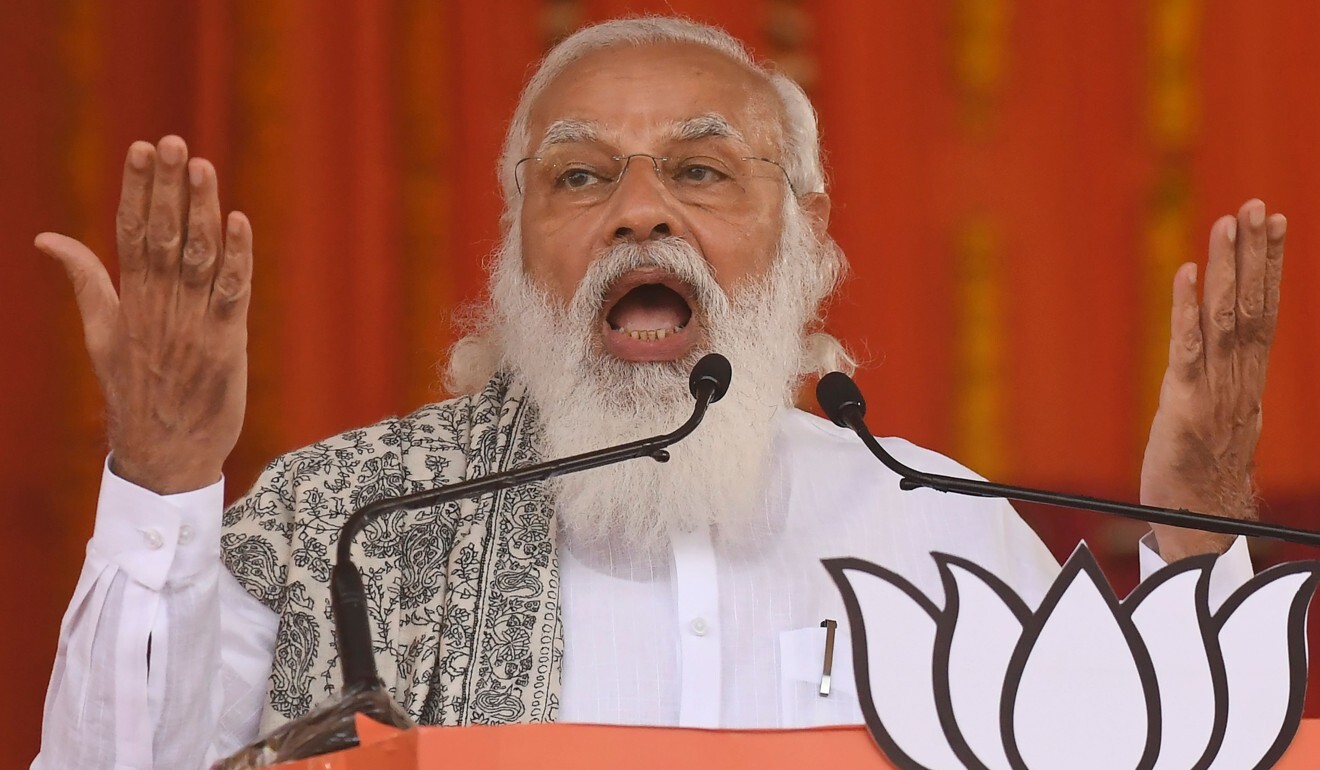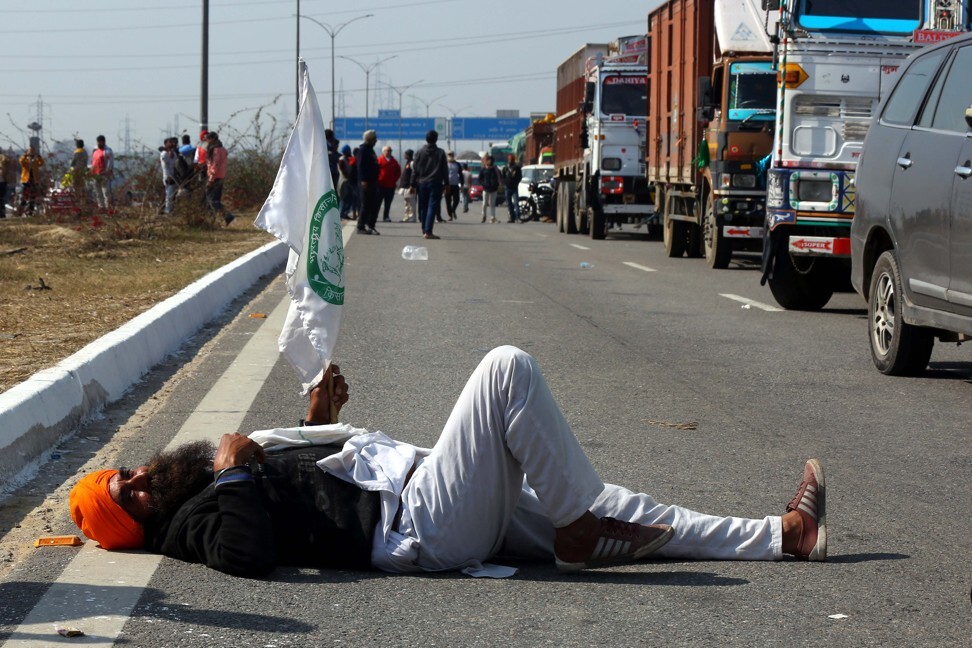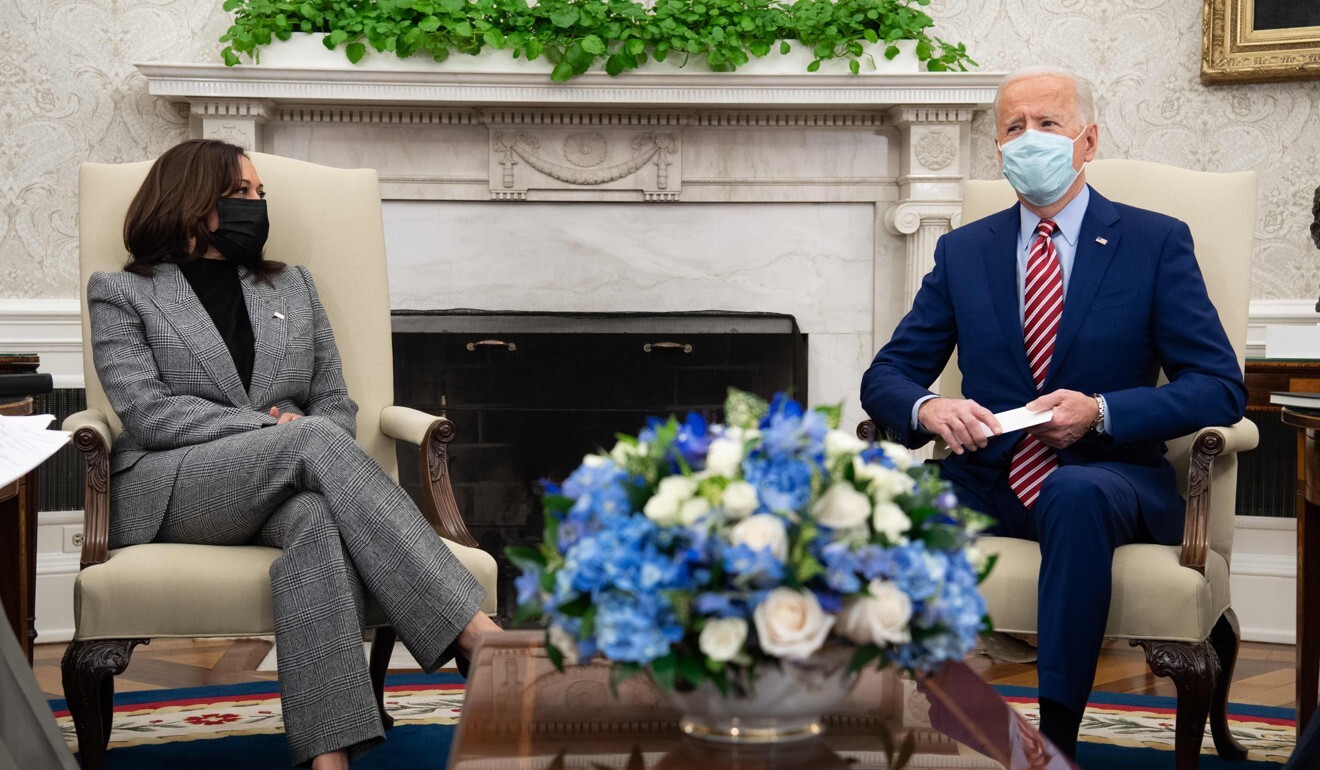
02:04
Defiant Indian farmers continue to protest after deadly clash on Republic Day

When US President Joe Biden and Indian Prime Minister Narendra Modi spoke last week, both agreed on the need for a “rules-based international order and a free, open and inclusive Indo-Pacific”’.
But the readouts that Washington and New Delhi provided on the chat revealed the two countries’ differences on some key issues, even as they pledged to address the challenges posed by Covid-19, climate change and the revival of a moribund global economy.

02:04
Defiant Indian farmers continue to protest after deadly clash on Republic Day
While Washington’s statement mentioned commitment to a regional architecture in the Indo-Pacific through the Quadrilateral Security Dialogue, or “Quad” – an informal alliance comprising the US, India, Japan and Australia that is meant to be a bulwark against Beijing’s assertiveness – New Delhi avoided using the term.
And while New Delhi’s statement said the India-US partnership was firmly anchored in a “shared commitment to democratic values”, Washington said Biden underscored his desire to “defend democratic institutions and norms around the world”.
Analysts said India is hesitant to formalise the Quad grouping – that Beijing has denounced – even as the two countries have been locked in a military dispute at their shared Himalayan border for 10 months. Both sides have since last Wednesday started pulling troops back from the Line of Actual Control (LAC).
But the different references to democracy was what drove speculation. Some experts saw Washington’s position as primarily relating to the recent military coup in Myanmar while others viewed it as subtle criticism of New Delhi’s ongoing confrontation with Indian farmers opposing agricultural reforms that they say will only benefit large corporations. The Indian government maintains that the reforms will boost investment in a sector that accounts for nearly 15 per cent of India’s US$2.9 trillion economy but employs about half its workforce.
C. Raja Mohan, director of the Institute of South Asian Studies at the National University of Singapore, said the statements did not reveal any serious differences and described attempts to suggest otherwise as creating a “storm in a teacup”.
Several former Indian diplomats, who declined to be quoted, said Biden’s stress on defending democratic institutions should be seen in the context of a post-Donald Trump United States that is trying to recover from a highly polarised time in its history and is aiming to restore democratic norms.

But others said India needed to be prepared for a new US administration that would put safeguarding human rights and democratic norms at the forefront of bilateral relations.
“Democracy and human rights were hardly front and centre in the Trump administration. I expect this will change in a Biden presidency,” said Milan Vaishnav, director of the South Asian programme at the Washington-based Carnegie Endowment for International Peace.
The US has already waded into the Indian government’s ongoing row with farmers, after they clashed with police last month in the heart of the Indian capital.
In the ensuing days, internet services were temporarily suspended in some parts of the country and the New Delhi called on Twitter to block over 1,000 accounts for inciting violence on the day.
The government’s move drew widespread criticism, including from teenage activist Greta Thunberg and American singer Rihanna, while the US embassy in India called for differences between the government and farmers to be resolved through talks.
“We recognise that unhindered access to information, including the internet, is fundamental to the freedom of expression and a hallmark of a thriving democracy,” the US embassy statement said.
White House Press Secretary Jen Psaki told reporters at her daily briefing that the US was always concerned about crackdowns that did not allow people to “communicate and peacefully protest”.
But India’s External Affairs Ministry struck back at the criticisms, justifying its actions by saying the violence in New Delhi was comparable to what happened in Washington last month, when pro-Trump supporters stormed Capitol Hill.
It also blamed “anti-Indian elements” for fomenting international criticism to sully India’s image abroad.
Kanwal Sibal, who was India’s foreign secretary from 2001 to 2002, said that Washington’s remarks on India’s “internal” affairs were uncalled for, and that the same “anti-Indian elements” could muster support in coming days from lobby groups in the US to “activate themselves on human rights and religious and press freedom issues relating to India”.
Sibal said the US should be careful in making statements on India’s affairs, as India could just as easily comment on hot-button issues in the US like the polarised political environment and deepening racial tensions.
But such tit-for-tat criticisms would “only create unpleasantness and hurt ties,” he said, adding that “both sides will lose in the process”.

WILL THE UPSWING LAST?
There has generally been an upswing in India-US relations since 2000, with successive US administrations building a bipartisan consensus to support strong ties with New Delhi.
The US is now India’s largest trade partner, and trade between the two sides reached US$146 billion in 2019, according to the US Trade Representative Office. Under the Trump presidency, the two sides concluded defence deals worth US$3 billion. Both sides also signed the US-India Comprehensive Global Strategic Partnership last year, allowing for cooperation in a wide range of areas, including defence and security.
When Obama visited New Delhi in January 2015, he publicly expressed concerns about religious freedom in India.
“India will succeed so long as it is not splintered along the lines of religious faith, as long as it is not splintered along any lines, and it is united as one nation,” Obama said at the time.
Under Trump, there was little official criticism of India’s decisions to remove the special constitutional status of Muslim-majority Jammu and Kashmir that gave it the right to make its own laws in August 2019, and to pass a new law in December 2019 that allowed religious minorities persecuted in neighbouring countries the right to obtain citizenship in India – except Muslims. It was only earlier this month that India said it would restore high-speed internet in Jammu and Kashmir after 17 months of internet curbs and curfews.
But analysts who say that the US will be tougher on Modi’s government when it comes to values of rights and freedoms point to how the Biden administration has 20 members of Indian heritage or origin, such as Vice-President Kamala Harris. Sameera Fazili, the deputy director of the National Economic Council, and Aisha Shah, the partnership manager at the White House office of digital strategy, both have roots in Kashmir.
Attention on rights in India has continued within the US, with the New York State Assembly last week passing a resolution last week making February 5 “Kashmir American Day” in that state. The Indian government reacted sharply, saying: “India celebrates its diversity and rich cultural mosaic, including in Jammu and Kashmir, which is an integral and inalienable part of India.”
The farmers’ protests also figured in the Congressional India Caucus meeting on February 7. The Caucus – a vocal legislative constituency in the US Congress that works towards bolstering ties between the two countries, asked India’s ambassador in Washington, Taranjit Singh Sandhu, to ensure that the norms of democracy were maintained and protesters were allowed to demonstrate peacefully.
Meanwhile, the Sikh community in California put up a crowdfunded commercial on the Indian farmer’s protest with the message “No farmers, No Food, No Future” during the Super Bowl on February 7 that was aired right before the NFL championship game, which is the most-watched sporting event in the US, attracting over 100 million viewers.

Talmiz Ahmad, who served as spokesman for India’s foreign ministry in 1997, said the onus was on India to explain the decision regarding measures it had taken to deal with violence during the farmers’ protests and not just dismiss criticism by US government officials and others over the issue as attempts to interfere in “internal issues”.
“There is bound to be global scrutiny on legislation you pass and decisions you take at home,” Ahmad said. “If questions are raised on them by other countries, it is the job of diplomats, officials and politicians to engage and convince them of the rationale behind your decision.”
There are about 3 million people of Indian origin who live in the United States and while many are supportive of the Modi government, others have spoken out about the decline in India’s secular traditions under a Hindu-nationalist administration.
Vaishnav of the Carnegie Endowment for International Peace agreed there was “concern in Washington about democratic backsliding and an erosion of fundamental freedom” in India in recent years.
But, he added, “there is also a clear-eyed recognition of the gathering China threat”.
“I expect the [Biden] administration will chart a course that allows it to speak up for what it believes in to the extent it avoids doing lasting damage to broader bilateral ties,” he said.